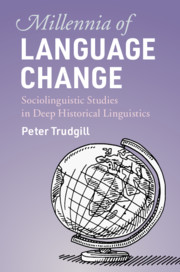Book contents
- Millennia of Language Change
- Millennia of Language Change
- Copyright page
- Dedication
- Contents
- Acknowledgements
- Prologue: the Long View
- 1 Prehistoric Sociolinguistics and the Uniformitarian Hypothesis: What Were Stone-Age Languages Like?
- 2 From Ancient Greek to Comanche: on Many Millennia of Complexification
- 3 First-Millennium England: a Tale of Two Copulas
- 4 The First Three Thousand Years: Contact in Prehistoric and Early Historic English
- 5 Verner’s Law, Germanic Dialects and the English Dialect ‘Default Singulars’
- 6 Deep into the Pacific: the Austronesian Migrations and the Linguistic Consequences of Isolation
- 7 The Hellenistic Koiné 320 bc to 550 ad and Its Medieval and Early Modern Congeners
- 8 Indo-European Feminines: Contact, Diffusion and Gender Loss around the North Sea
- Sources
- References
- Index
1 - Prehistoric Sociolinguistics and the Uniformitarian Hypothesis: What Were Stone-Age Languages Like?
Published online by Cambridge University Press: 25 March 2020
- Millennia of Language Change
- Millennia of Language Change
- Copyright page
- Dedication
- Contents
- Acknowledgements
- Prologue: the Long View
- 1 Prehistoric Sociolinguistics and the Uniformitarian Hypothesis: What Were Stone-Age Languages Like?
- 2 From Ancient Greek to Comanche: on Many Millennia of Complexification
- 3 First-Millennium England: a Tale of Two Copulas
- 4 The First Three Thousand Years: Contact in Prehistoric and Early Historic English
- 5 Verner’s Law, Germanic Dialects and the English Dialect ‘Default Singulars’
- 6 Deep into the Pacific: the Austronesian Migrations and the Linguistic Consequences of Isolation
- 7 The Hellenistic Koiné 320 bc to 550 ad and Its Medieval and Early Modern Congeners
- 8 Indo-European Feminines: Contact, Diffusion and Gender Loss around the North Sea
- Sources
- References
- Index
Summary
One of the fundamental bases of modern historical linguistics is the uniformitarian principle. This principle states that knowledge of processes that operated in the past can be inferred by observing ongoing processes in the present. The notion of uniformitarianism can be credited to British scientists, beginning with the work of the Scottish geologist James Hutton, who lived from 1726 to 1797. This was extended in the thinking of another Scot, John Playfair (b. 1748). And it became widely known as a result of the work of yet another Scot, Charles Lyell, in his 1830 work, Principles of geology.
Information
- Type
- Chapter
- Information
- Millennia of Language ChangeSociolinguistic Studies in Deep Historical Linguistics, pp. 7 - 16Publisher: Cambridge University PressPrint publication year: 2020
Accessibility standard: Unknown
- 1
- Cited by
